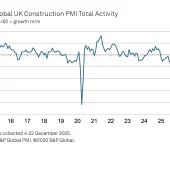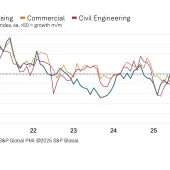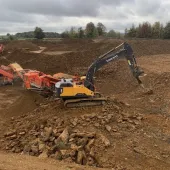New housing planning policy proposals prompt MPA response
Both Government and the Opposition have failed to recognize the importance of the supply chain, says MPA
TWO different policy proposals to boost house building, announced by the Government and the Labour Opposition, have triggered a reaction from the Mineral Products Association (MPA).
Following reports of a significant Labour policy proposal on new towns, the MPA has written to the Shadow Planning Minister, Matthew Pennycook MP. This comes at the same time as the Government announces plans to scrap the Nutrient Neutrality restrictions on house building.
The underlying message from both the Government and the Opposition is that they are ready to support the delivery of new homes, but neither has recognized the importance of the construction supply chain in realizing their housing ambitions.
In the letter, Robert McIlveen, the MPA’s director of public affairs, stresses the key issues faced by producers of mineral products like aggregates, concrete, and asphalt. His letter points out that these materials literally form the foundations for all new building work:
‘Infrastructure, housing, and the new workplaces, schools, and hospitals that your plan implies will be delivered, all rely on mineral products for construction, including concrete (and its ingredients aggregates and cement), mortar, stone, and asphalt for roads, pavements, and cycle paths. This supply chain is often taken for granted, despite being the largest material flow in the economy, and faces a longstanding challenge in replenishment rates for permitted reserves, particularly for sand and gravel. Since 2010 there has been much less strategic planning, which has led to this situation.’
Mr McIlveen goes on to highlight the findings of two recent MPA publications:
The Annual Mineral Planning Survey, the most recent of which found that for every 100 tonnes of sand and gravel extracted, only 63 tonnes are permitted for future extraction.
The recent paper setting out scenarios to 2035 for aggregates demand showing a significant increase in the need for aggregates and the options to meet that need.
‘The MPA is keen to engage all parties and so Labour’s announcement is a good opportunity to remind them of the role the sector plays,’ said Mr McIlveen. ‘As they develop their policy proposals ahead of the next General Election, we are determined to ensure they understand the challenges the sector faces and the ramifications of assuming a supply of essential materials.’
Aurelie Delannoy, the MPA’s director of economic affairs, added: ‘As key suppliers to the construction sector, including for house building, manufacturers of mineral products will welcome the nutrient neutrality changes. But near-term, the knock-on effect of a weak macroeconomic background, rising interest rates, and subdued housing demand are a much greater problem which neither Labour’s plans, nor the Government’s changes to UK environmental rules, will help with.










